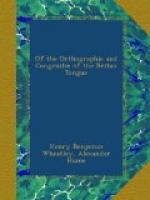6. Tyme past befoer is of a thing befoer done and ended; as, at four hoores, or quhen you spak to me, I had written.
7. Tyme to cum is of that q_uhi_lk is not yet begun; as, at four houres I wil wryte.
OF THE POWER OF THE VERB.
Cap. 10.
1. A verb signifies being or doeing. Of being ther is onelie one, I am, and is thus varyed.
2. In the present tyme, I am, thou art, he is; we are, ye are, they are.
3. In tyme passing befoer, I was, thou was, he was; we wer, ye wer, they wer.
4. In tyme past els, I have bene, thou hes bene, he hes bene; we have bene, ye have bene, they have bene.
5. In tyme past befoer, I had bene, thou had bene, he had bene; we had bene, ye had bene, they had bene.
6. In tyme to cum, I wil be, thou wilt be, he wil be; we wil be, ye wil be, they wil be.
7. Verbes of doing are actives or passives.
8. The active verb adheres to the person of the agent; as, Christ hath conquered hel and death.
9. The passive verb adheres to the person of the patient; as, hel and death are conquered be Christ.
10. These our idiom conjugates onelie in tuo tymes, the tyme present and tym past; as, I wryte, I wrote; I speak, I spak; I here, I hard; I se, I saw; I fele, I felt.
11. The other differences of tyme ar expressed be the notes of the verb of being, or be the verb of being it self, and a participle; as, I was wryting; I have written; I had written; I wil wryte.
OF THE ADVERB.
Cap. 11.
1. A word impersonal is q_uhi_lk in al formes of speach keepes one face, and this is adverb or conjunction.
2. An adverb is a word adhering mast com_m_onlie w_i_th a verb with one face in al moodes, tymes, nu_m_beres and persones; as, I leve hardlie, thou leves hardlie; I did leve hardlie; I have leved hardlie; I had leved hardlie; I wil leave hardlie; leve he hardlie; God forbid he leve hardlie.
3. Our men confoundes adverbes of place, q_uhi_lk the south distinguishes as wel as the latin, and therfoer let us not shame to learne.
4. They use quher, heer, ther, for the place in q_uhi_lk; quhence, hence, thence, for the place from quhilk; quhither, hither, thither, for the place to q_uhi_lk; as, quher dwel you? quhence cum you? quhither goe you?
5. They also distinguish wel in, into, and unto: in, they use with the place quher; into, with the thing quhither; and unto, for how far; as, our father, q_uhi_lk art in heavin, admit us into heavin, and lift us from the earth unto heavin.
6. Heer, becaus sum nounes incurre into adverbes, let us alsoe noat their differences.
7. First no and not. Noe is a noun, nullus in latin, and in our tongue alwayes precedes the substantive quhilk it nulleth; as, noe man, noe angle, noe god.




